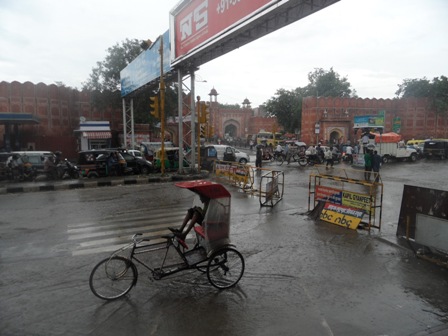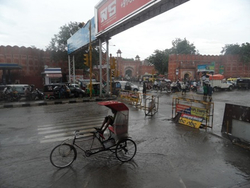Focus on Indian cities' responses to climate change at first ACCCRN National Conference

As cities expand and resource footprints extend to regional, national and global levels, it is essential that integrated development decisions should be inclusive and sustainable across scales. This was the focus of the 1st National Conference on Emerging mechanisms and responses of cities to climate change, held in New Delhi, India on 10 December 2013, which looked at the various approaches and experiences in developing resilience across the Asian Cities Climate Change Resilience Network (ACCCRN) Indian cities.
Organised by TARU Leading Edge with active support from the ACCCRN partners and funded by the Rockefeller Foundation, the conference looked at resilience across the diverse cross-cutting themes of urbanisation, poverty and climate, bringing together practitioners and experts, showcasing the latest knowledge and implementation work in the region and catalysing policy debate on urban climate change resilience to develop integrated solutions.
Representatives from Shimla and Leh, two of the ACCCRN cities ICLEI South Asia is working with, attended the event as well. Leh Chairman, Mr. Rigzin Spalbar, had the honor of launching the movie "Path to resilience: A tale of two cities", while Shimla Deputy Mayor Panwar took part in the panel discussion on “Synergy across scales: Options for climate change informed urban development”.
Large population, lack of proper infrastructure, and, often, the location in coastal or hazardous areas, make Asian urban centres particularly vulnerable, trying to balance the rapid urbanisation with climate change challenges and the resulting vulnerability. The ACCCRN programme, funded by the Rockefeller Foundation, has been designed to support cities in this transition. “More collaboration is needed to achieve change”, said Mr. Ashvin Dayal, Associate Vice President, Managing Director, Asia Rockefeller Foundation, introducing the Urban Climate Change Resilience (UCCR) Partnership, a new trust fund created by The Rockefeller Foundation, the UK Department for International Development (DFID) and the Asian Development Bank (ADB), to support peer to peer learning across cities and institutions and designed to scale up urban climate change resilience in 25 Asian cities.
One of the key objectives of ACCCRN is to share success stories and encourage cities around the world to replicate effective strategies and activities, and this is what the 1st National Conference on Emerging mechanisms and responses of cities to climate change shed light upon.
Some of the main outcomes of this conference were as follows:
- There is a growing need for both soft and hard measures for Asian cities to manage risks related to climatic hazards like typhoons and cyclones.
- India needs sustainable and inclusive growth. As we foster growth, we need to bring in climate related challenges. What is crucial is the need to build awareness at the citizens’ level, and to build a bridge between research and policy – ACCCRN is working on this, trying to link research-policy-action and to build capacity within the local governments themselves.
- To be effective, the resilience building process must be ‘owned’ by the local governments themselves, and thus internally driven and built on a strong involvement of local stakeholders, as the experience on the ground of ICLEI South Asia has proven and as Shimla Deputy Mayor, Mr. Tikender S Panwar, properly expressed,“Elected officials must be engaged and common people must be involved in any resilience strategy.”
- A number of initiatives and tools to support local governments are already existing or being developed, such as the ICLEI ACCRN Process, a tool developed by ICLEI to support local governments assess their climate risks, and formulate and implement corresponding resilience strategies. Tested in 3 Indian cities, the Process will now be replicated in other 40 cities in 4 Asian countries. The policy briefs, synthesis reports and case studies developed by TARU and ACCCRN partners summarise the urban climate change resilience projects and insights gained by ACCCRN’s work in India and further support the adaptation building process of cities in the country.
The outstanding results of Surat, the ICLEI member city who made it to the first batch of 33 Rockefeller Foundation Resilient Cities, were also shared during the workshop. With a focus on community social resilience and capacity building towards resilience planning, the city has now included for the first time one line on climate change in their municipal budget.
For an additional and complimentary perspective on challenges and solutions to climate change, download the AsianCitiesAdapt Learning Exchange main outcomes!
More information on ICLEI South Asia’s ACCCRN activities can be found here.
For more information on ACCCRN, click here.
Click here to view the movie "Path to resilience: A tale of two cities".
